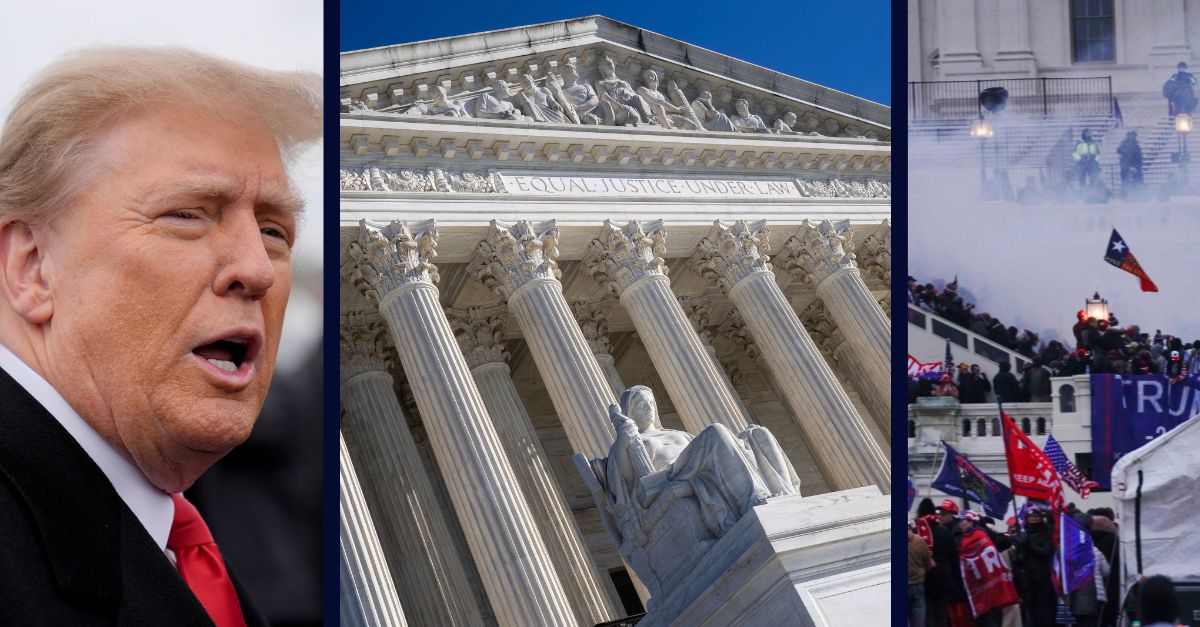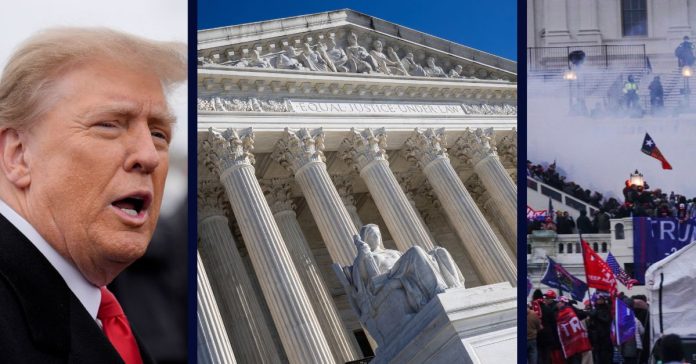
Left: Donald in Londonderry, N.H., Jan. 2024. (AP Photo/Matt Rourke). Center: The U.S. Supreme Court. Jan. 2024. (Francis Chung/POLITICO via AP). Right: Trump supporters seize the Capitol building Jan. 6, 2021. (John Nacion/STAR MAX/IPx).
A distinguished group of retired four-star generals and admirals from the U.S. military have argued in a brief filed in the U.S. Supreme Court on Monday that Donald Trump’s claims of absolute “presidential immunity” from criminal prosecution tied to Jan. 6 is an “assault” on the “foundational commitments” underpinning democracy and if his argument is allowed to succeed before them later this month, it threatens “to subvert the careful balance between the executive and legislative branches struck in the Constitution.”
The 38-page amicus brief features 19 authors, all of them decorated retired admirals, generals or secretaries from branches of the U.S. Army, Navy and Air Force respectively. On April 25, the high court is poised to hear Trump’s question of immunity against prosecution for his alleged criminal conspiracy to subvert the results of the 2020 election. and according to the brief, these are arguments that should be approached with extreme caution.
“Petitioner’s theory of presidential immunity threatens to subvert the careful balance between the executive and legislative branches struck in the Constitution. For example, if emboldened by absolute immunity, the President might unsuccessfully seek authorization from Congress to undertake a certain action and then attempt to have the military carry out that action even though Congress rejected it. Moreover, our Constitution directs the people’s elected representatives in Congress to enact criminal laws that the executive is tasked with enforcing; allowing the President to violate those laws with impunity fundamentally distorts this constitutional allocation of powers,” they wrote.
They continued:
The Constitution subjects the armed forces of the United States to civilian control and the rule of law. These limits on the military are bedrock features of our democracy and are deeply rooted in our nation’s history. From the Founding to the present day, a steadfast commitment to these principles has successfully guided us through two world wars and numerous other conflicts; provided the stability needed for our democratic republic to flourish; and ensured that the military has the capacity to defend our nation by being trained and ready to fight and win its wars. Petitioner’s theory of presidential immunity from criminal prosecution is an assault on these foundational commitments.
As Law&Crime has previously reported, Trump contends that the president cannot function, as a matter of fact, without total immunity from the threat of prosecution.
It would “incapacitate every future president with de facto blackmail and extortion while in office and condemn him to years of post-office trauma at the hands of political opponents,” Trump’s legal team told the Supreme Court in February.
But this is not so, according to the brief filed on Monday. The career military officials say that if Trump’s version of immunity were to be accepted, it would “severely undermine the commander-in-chief’s legal and moral authority to lead the military forces” because it would for once and all signal that “they but not he must obey the rule of law.”
“Under this theory, the President could, with impunity, direct his national security appointees to, in turn, direct members of the military to execute plainly unlawful orders, placing those in the chain of command in an untenable position and irreparably harming the trust fundamental to civil-military relations,” they wrote.
Calling Trump’s view “profoundly ahistorical,” the career military officials wrote that “absence of absolute immunity is something that has been correctly assumed since the founding” of the nation and that contrary to his point, no president before him has been damaged or inhibited as he suggests even as the threat of facing criminal prosecution hung over their heads all the same.
Some of the authors include Ray Mabus, who served as the 75th Secretary of the Navy from 2009 to 2017. Mabus was the longest to serve as leader of the Navy and Marine Corps since World War I. Other filers include retired General Michael Hayden of the Air Force. A four-star general, Hayden served as Director of the Central Intelligence Agency and the National Security Agency as well as Commander of the Air Intelligence Agency. For a complete list of authors, click here.
On the very last day of its term, the Supreme Court will hear question that Trump has used to gird every defense he has made while he faces felony indictments in multiple venues.
The case involving his alleged conspiracy around Jan. 6 has been waylaid for nearly a year — he was indicted last August. Trump’s team has pushed repeatedly to see the criminal trial in Washington, D.C., extended beyond the November election. Whether he will get his wish is uncertain but U.S. District Judge Tanya Chutkan has indicated a willingness to keep as tight a schedule as possible and special counsel Jack Smith has expressed the same.
The order stated only that the court would resolve the question of “whether and if so to what extent does a former president enjoy presidential immunity from criminal prosecution for conduct alleged to involve official acts during his tenure in office[.]”
At the center of Trump’s defense to the charges in Washington, D.C., is something the retired military officials argue would “harm our national security and undermine our role as the international standard-bearer of democracy.”
“Presidential transitions are times of significant national security risk. Leaders in the outgoing administration must prepare their successors to take the reins, and any complications in this handoff can diminish the successors’ preparedness to handle national security threats,” they wrote.
The U.S. Circuit Court of Appeals ruled against Trump’s stark bid for “absolute immunity” as president already. The judges resoundingly rejected his claims that under certain circumstances, a former president could even get away with murdering his political rivals.
Have a tip we should know? [email protected]

